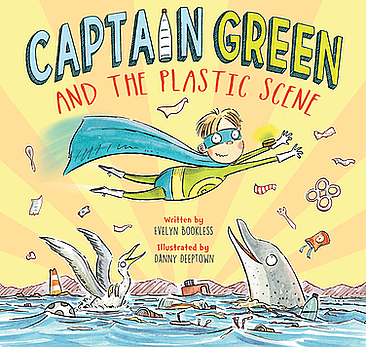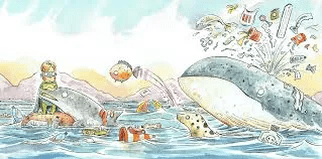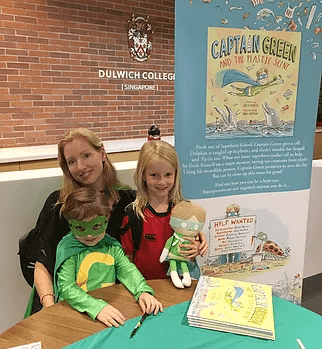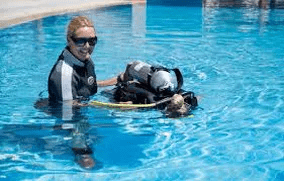“Mum, you shouldn’t use a straw!” – Heard that one before? The awareness on how to educate kids to become climate and eco-savy is on the up – more and more schools are incorporating it into the curriculum and often you will find that it’s your CHILD teaching YOU, how to to look after our planet!
But one thing is teaching kids that ‘plastic is bad’ – HOW it’s done is essential for the message to stick in the minds of the future – our kids, who’ve inherited this damaged Earth and who have no choice but to reverse the damage as quickly as possible. We have spoken to 3 adult eco-warriors who have chosen an alternative approach to teaching our future green ambassadors: A school-leader, an author and a diver.
The Green School
No walls, a bamboo black board, breeze passing through. Look out and you will see a garden, a river and perhaps a buffalo. Not your usual school environment, but in Bali, this could be your classroom. In September, The Green School is celebrating it’s 10 years, a vision generated and materialised by the couple Cynthia and John Hardy.
The school has your classic subjects, such as reading, writing, maths and science + a big emphasis on the arts, but the mission is to teach the kids to be in “a community of learners, making the world sustainable”. One of the topics is “Green Studies”, where the kids are taught ecology and sustainability and the teachers use a ‘hand-on’ approach, where the students get their ‘hands dirty’ and connect to local geography and community.
“All kids thrive here, the kids lean to plan, harvest and cook organic rice. They pick the organic veg, learn bamboo building and even do mud wrestling in the mud fields! These kids are learning how to live in the future, they will be our global green leaders”, says John Hardy
The couple’s vision or turning a classic school – a ‘square’ – into a ‘bubble’, has achieved a renowned reputation across the globe. For its teaching methods, where guest teachers and organisations such as The Green Leap are also invited, but in particular for the environment and community, that the founders have managed to establish for the kids. All buildings are a 100% bamboo with solar panels, compost toilets, green fences, homemade pavements to name a few – and now green houses and businesses are appearing around the school creating a green community around the school too.
“We are building Green School to create a new paradigm for learning. We want children to cultivate physical sensibilities that will enable them to adapt and be capable in the world. We want children to develop spiritual awareness and emotional intuition, and to encourage them to be in awe of life’s possibilities.”
Read more about The Green School and their camps here.
Captain Green
“It is I, Captain Green, the Caped Captain of Clean, protecting the planet Earth from Pollution and Grime”
Not your usual boy. A super hero in a green, G-labeled costume, with incredible powers on a major mission: Saving sea creatures from plastic! The message from author Evelyn Bookless is clear, and the illustrations from Danny Deeptown inviting and engaging for both kids and adults. And Captain Green, published April this year, is not just a great and page turning children’s book – but a teaching tool that is a “fun way to teach young children about the dangers of plastic waste and how they can become true ´super humans’.” according to the Marine Conservation Society in the UK.

The book is flying off the shelves and author Evelyn Bookless has been touring all the big schools in Singapore, reading from the book and inspiring kids to take action. The idea of a green superhero came to Irish-born Bookless, when holidaying on the Indonesian island Bintan. She witnessed the plastic polluted beaches and thought that to communicate the problem with images like the ones that met her family at Bintan, would be the way to go.
“The pages that really resonates with the kids are the illustrations of the whales, seal and fish and their battles with plastic. Particularly the illustration of trash coming out of the whale’s blowhole is mentioned every time I speak to children”, Evelyn Bookless explains.

“No child wants to see animals in distress and for the saviour to be a superhero makes the story more fun, while still passing on the important message. My son bumped into some friends recently who said “Let’s play captain Green” and in year 5 at my his school, I’ve been told that a group of boys are discussing what Captain Green’s next mission should be! It’s a nice way to educate the kids – to empower them by making the topic ‘trendy’ – friends tell friends, etc.” Bookless says.

The book has had kids coming away bursting with ideas and at most schools the presentations have been part of a theme, where the words Reduce, Reuse, Recycle (solutions presented by Captain Green at the end) are appearing on the class walls and incorporated in presentations.
“The problem can seem so overwhelming, that it’s important to teach the kids that the little changes can make a big difference and perhaps even make them do a pledge to stop using straws for example.
The book is a way of being part of the plastic revolution and show that there is hope, if we all do our part”.
Evelyn Bookless is speaking at the Happy Sparks Festival on June 23rd at 4:30 pm where you child can also do an eco-craft hand-on activity.
Read more about Evelyn Bookless and Captain Green here:
Orca Scuba
“Together we can turn tides” is the name of Jeroen van de Waal’s book and the motto for his venture to educate kids about marine life and the plastic ocean. With his company Orca Scuba he runs programmes at 95 schools in Singapore, with long and short workshops about the state of the ocean and reef and suggestions to what can be done to save it. Through his scuba diving centres in Singapore, Indonesia, Thailand and Malaysia, the staff also get a chance to connect directly to the kids, either when they come for school camps or come diving on holiday. Here, the kids can apply their prior knowledge with their diving experiences and use it as a catalyst to get involved and interested the ocean and marine biology.
For Jeroen, it’s vital to get to the kids involved early:
“When you take kids into a candy store, you can be 99% sure that at one time or another, they will convince their parents to buy something. It’s the same with knowledge. Kids have very strong opinions, and if they are not happy about the state of our ocean or how the family disposes waste in the household, they will most probably convert their parents eventually”, Jeroen van de Waal explains.
Jeroen van de Waal believe that kids can come up with creative solutions and connect it to the knowledge that people like his team at Orca has, and in that way ‘change tides’, so to speak. See the illustrative video, that Jeroen uses in his talks HERE

OrcaScuba is presently offering courses for kids in Singapore on corals, turtles, plastic in the oceans, beach clean-up and much more, but the plans are now expand the education from Singapore to educate Indonesian kids, not just on plastic, but on sanitation and diet.
If your child would like to learn how to dive, he or she can do a bubble-maker dive from 8 years, and junior open water from 10 years old – read more about this HERE.
Watch this space for our podcast interview with Jeroen van de Waal here.




